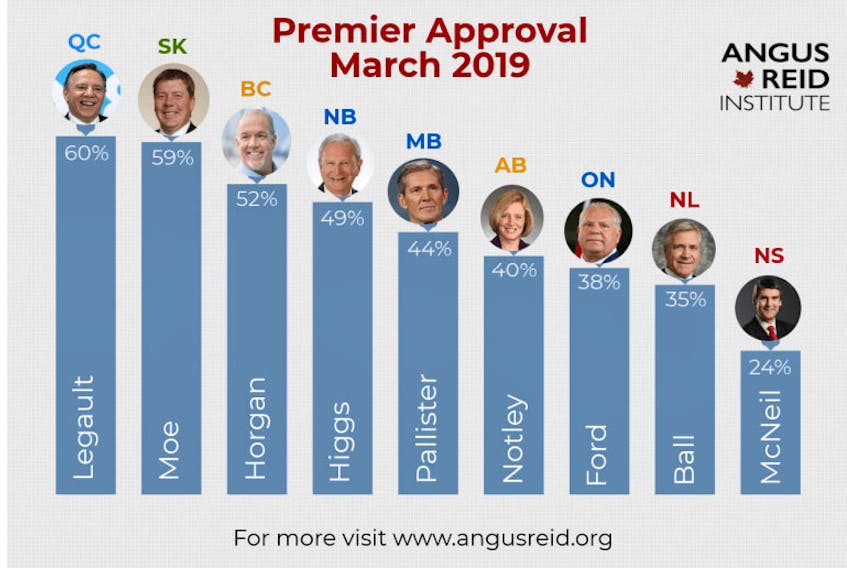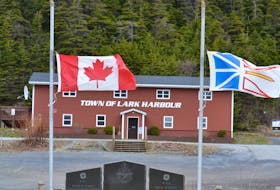Nova Scotia Premier Stephen McNeil is the least popular premier in the country for the second consecutive quarter, according to a new Angus Reid poll.
The online survey, conducted March 11-24, gauged approval ratings for premiers of all provinces, except for PEI and the territories. Only 24 per cent of Nova Scotian respondents said they approved of McNeil, while 72 per cent said they disapproved of the Liberal premier. Four per cent did not offer a definite opinion.
That’s a drop in support since December, when 30 per cent of respondents said they approved of McNeil, 56 per cent said they disapproved, and 14 per cent did not offer a definite opinion.
McNeil has been steadily slipping in popularity since his highest approval rating of 66 per cent in June 2014, shortly after he was first elected. This survey marks his lowest rating yet.
According to Angus Reid’s analysis of the figures, McNeil has faced criticism over perceived failures in promised health care improvement and allocating spending for the Bar Harbor, Maine, ferry terminal in recent months.
Shachi Kurl of Angus Reid said this sort ennui among voters following the honeymoon period after an election is a relatively common phenomenon.
“It’s often a time where policy decisions are being made that are perhaps not the most popular,” she said.
It’s also worth noting that the two premiers with the lowest ratings — McNeil and Newfoundland and Labrador Premier Dwight Ball, are the only Liberals among the nine, something Kurl said might be spillover from concerns with the federal government — or not.
In the new poll, 35 per cent of Newfoundlanders and Labradorians surveyed said they approved of Ball, 61 per cent said they disapproved, and four per cent did not offer an opinion. In the last quarter 32 per cent said they approved of him, 59 per cent said they disapproved, and five per cent did not offer a definite opinion.
“When Dwight ball had 60 per cent approval in Newfoundland and Labrador in early 2016, arguably that probably had a lot to do with how warm and fuzzy and people were feeling about Justin Trudeau at the time. And Steven McNeil I think to an extent also was a beneficiary of that Trudeau bump,” Kurl said. “Can we as directly tie a correlation of the waning of approval to Trudeau’s own problems in Ottawa these days? I think we’d have to watch that trend line a little bit more.”
Canada’s newest premier — Progressive Covservative Blaine Higgs of New Brunswick — saw a nine-point increase in approval, rising from 40 to 49 per cent since the last poll a month after his election.
“What we often see in the initial month after a premier is elected, people get to know that person,” Kurl said. “So maybe they voted for a party, but then they're getting to know their leader. And particularly if we're seeing policy moves (and) voters have ... given a mandate to the party and then those things are being acted on, that can have an elevating effect on approval.”
For the second quarter in a row, Quebec Premier François Legault (Coalition Avenir), who assumed office in October 2018, is Canada’s most popular provincial head of government, enjoying the approval of six-in-ten Quebecers, unchanged from December. He is followed by Saskatchewan Premier Scott Moe (Saskatchewan Party) — elected in February of 2018 — who enjoys a similar approval rating at 59 per cent, and British Columbia Premier John Horgan (New Democratic Party), who was elected in July 2017 and is backed by just over half of his province.
Ontario’s Progressive Conservative Premier Doug Ford, elected in June 2018, had an approval rating of 38 per cent in March, compared to 42 per cent in December.
“We’re into a period of quite a bit of dynamic change on the provincial landscapes. A few years ago there would have been a time where a number of provincial premiers were in the high 20s or the low 30s,” she said. “Familiarity doesn’t always breed warm and gooey feelings. It can breed a sense of ambivalence.”
Kurl also said it’s important for people to realize that approval ratings shouldn't be conflated for political party support or voter intention.
For the poll, a sample size of 5,807 adult Canadian residents who are members of the Angus Reid Forum was used. But the margin of error varies from province to province. In larger provinces, such as Ontario, it’s only +/- 3.1 per cent, and in provinces with smaller sample sizes like Newfoundland and Nova Scotia, it’s much higher at about +/- 6 per cent.
RELATED:









